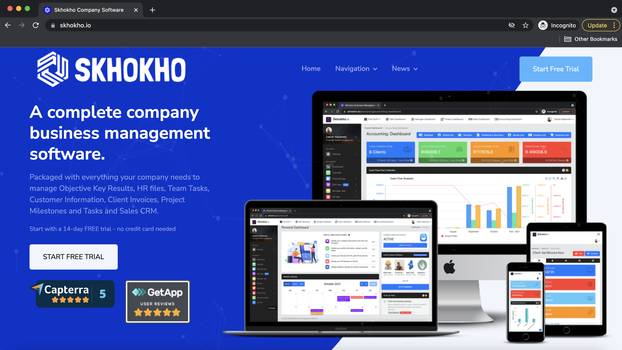The Future of Business: Why Purpose-Driven Companies Will Thrive
In recent years, the concept of purpose-driven business has gained momentum as companies increasingly recognize the importance of having a clear purpose beyond simply making profits. But what exactly does it mean to be a purpose-driven business, and why is this approach becoming more prevalent? In this blog post, we will explore the future of business and why purpose-driven companies are poised to thrive in the years to come.

We will cover the following topics:
- Definition of purpose-driven business & Importance of discussing the future of business
- Purpose-Driven Business: The Current Landscape
- The Advantages of Being a Purpose-Driven Business
- The Future of Business is Purpose-Driven
Definition of purpose-driven business & Importance of discussing the future of business
First, let's define what we mean by a purpose-driven business. Essentially, a purpose-driven business is one that places its mission and values at the core of its operations, beyond just generating revenue. This can involve having a clear social or environmental mission, or simply prioritizing the well-being of employees and customers alongside financial success.
Why is it important to discuss the future of purpose-driven business? For one, there is growing evidence that purpose-driven companies tend to outperform their peers in terms of financial results, customer loyalty, and employee engagement. Additionally, with the rise of the millennial and Gen Z generations, who are more likely to seek out companies that align with their values, purpose-driven business is becoming a necessity rather than a nice-to-have. As we look to the future of business, understanding the advantages and strategies for building purpose-driven companies will be key to success.
Purpose-Driven Business: The Current Landscape

In recent years, purpose-driven business has emerged as a powerful force in the world of commerce. Companies are increasingly recognizing that they can no longer operate in a vacuum, focused solely on maximizing profits. Instead, there is a growing understanding that businesses have a responsibility to contribute positively to society and the environment, and that doing so can actually lead to greater long-term success.
The rise of purpose-driven business is evident in a number of ways. For one, we are seeing a surge in the number of B Corps, or Benefit Corporations, which are businesses that are legally required to consider the impact of their decisions on stakeholders beyond just shareholders. According to B Lab, the nonprofit organization that certifies B Corps, there are now over 4,000 B Corps in 77 countries, representing a wide range of industries.
Many traditional corporations are starting to adopt purpose-driven strategies, whether by creating corporate social responsibility programs, partnering with nonprofits, or implementing sustainable practices. Some companies are even going so far as to redefine their entire mission and brand around a particular cause or value, such as Patagonia's commitment to environmental stewardship or Ben & Jerry's focus on social justice.
These purpose-driven companies are not just doing good; they are also achieving impressive business results. For example, a 2021 report by the global consulting firm Accenture found that purpose-driven companies experienced a 47% higher revenue growth rate than their peers over the past five years. Another study by the consulting firm EY found that companies with a strong sense of purpose outperformed the S&P 500 index by a factor of 10 between 1996 and 2011.
Examples of successful purpose-driven companies abound. For instance, TOMS Shoes, which famously donates a pair of shoes to a person in need for every pair purchased, has built a loyal customer base and has donated over 100 million pairs of shoes since its founding in 2006. Another example is Warby Parker, which donates a pair of glasses to someone in need for every pair purchased and has raised over $6 million for nonprofit partners. And of course, Patagonia's commitment to sustainability and activism has helped it become a beloved brand among outdoor enthusiasts and environmentalists alike.
Overall, the current landscape of purpose-driven business is characterized by a growing recognition that businesses must do more than simply make money. By aligning their values and mission with the needs of society and the planet, purpose-driven companies are not only making a positive impact but also reaping the rewards of greater customer loyalty, employee engagement, and financial success.
The Advantages of Being a Purpose-Driven Business

Why are purpose-driven companies thriving in today's business landscape? There are several key advantages to this approach that can benefit businesses in numerous ways.
First and foremost, having a clear purpose beyond just making money can help a company differentiate itself in the marketplace. With so many choices available to consumers, businesses that are seen as doing good or having a positive impact can stand out and attract loyal customers. This is particularly true for millennials and Gen Z, who are more likely to seek out companies that share their values and are willing to pay more for products and services that align with their beliefs.
A strong sense of purpose can also help businesses attract and retain top talent. Employees want to work for companies that are making a positive impact and are committed to something beyond just profits. Purpose-driven companies often have higher employee satisfaction and engagement levels, which can translate into better performance and higher retention rates.
From a financial perspective, purpose-driven companies are often able to achieve greater long-term success than their profit-focused counterparts. This is because they are able to build stronger relationships with customers, employees, and other stakeholders, which can lead to greater loyalty and trust. Purpose-driven companies are also often better equipped to weather crises or challenges, as their commitment to a larger mission can help guide decision-making and rally stakeholders.
Purpose-driven companies are often better positioned to take advantage of emerging opportunities and trends. For example, as consumers become increasingly focused on sustainability and environmental impact, companies that have already prioritized these issues will be well-positioned to capitalize on this trend.
Lastly, purpose-driven companies are often able to create more meaningful and fulfilling experiences for all stakeholders. By prioritizing values and impact alongside profits, these companies are able to create a sense of purpose and connection that can be lacking in more profit-focused businesses. This can lead to greater satisfaction and fulfillment for employees, customers, and other stakeholders, and can create a more positive overall impact on society and the environment.
Overall, the advantages of being a purpose-driven business are clear: these companies are better able to differentiate themselves in the marketplace, attract and retain top talent, achieve greater long-term success, and create more meaningful experiences for all stakeholders.
The Future of Business is Purpose-Driven

As we look ahead to the future of business, it's becoming increasingly clear that purpose-driven companies will continue to thrive. Here are some of the emerging trends and factors that are driving this shift:
- Changing consumer expectations: As consumers become more socially and environmentally conscious, they are increasingly seeking out products and services that align with their values. This trend is particularly strong among younger generations, who are more likely to support purpose-driven companies and boycott those that are seen as harmful to society or the environment.
- Talent attraction and retention: In a tight labor market, purpose-driven companies are better positioned to attract and retain top talent. As the workforce becomes increasingly diverse and values-driven, businesses that prioritize purpose and impact will be more attractive to potential employees.
- Regulatory and legal pressures: Governments and regulatory bodies around the world are taking a closer look at corporate responsibility and sustainability. Purpose-driven companies that are able to demonstrate their commitment to social and environmental impact will be better positioned to comply with emerging regulations and avoid reputational damage.
- Technological disruption: Advances in technology are enabling purpose-driven companies to scale their impact and reach new audiences in innovative ways. For example, social media platforms allow businesses to connect with customers and stakeholders in real-time, while blockchain technology can be used to track and verify sustainability claims.
So, what does this mean for businesses that want to succeed in the future? Here are some steps they can take to prepare for and adapt to the shift towards purpose-driven business:
- Define and communicate a clear purpose: To differentiate themselves in the marketplace and attract customers and employees, businesses must have a clear and compelling purpose that goes beyond just making money. This purpose should be communicated consistently across all channels and should be backed up by concrete actions and initiatives.
- Embed purpose into all aspects of the business: Purpose-driven companies must ensure that their commitment to social and environmental impact is reflected in all aspects of the business, from supply chain management to marketing to product development.
- Measure and report on impact: To demonstrate their commitment to purpose and impact, businesses must measure and report on their progress towards their sustainability and social impact goals. This transparency can help build trust and credibility with customers, employees, and other stakeholders.
- Embrace innovation and technology: Purpose-driven companies should be open to new technologies and innovation that can help them scale their impact and reach new audiences. This could include using blockchain technology to track supply chain sustainability, leveraging social media to build customer engagement, or investing in renewable energy to reduce their carbon footprint.
By implementing these strategies, businesses can build a purpose-driven culture that drives innovation, attracts top talent, and creates long-term value for all stakeholders. Ultimately, purpose-driven businesses that prioritize sustainability and social impact are better positioned to succeed in the future and create a more just and equitable world.
Conclusion
In conclusion, the future of business is purpose-driven. The current business landscape shows a clear trend towards companies that prioritize sustainability and social impact, and emerging trends in society and technology are only reinforcing this shift. Purpose-driven businesses have a competitive advantage in attracting customers, employees, and investors, and creating long-term value for all stakeholders.
In light of these trends and opportunities, it's crucial for businesses to embrace purpose-driven strategies and become leaders in sustainability and social impact. By doing so, they can not only thrive in the future of business but also contribute to a better world for all.
Skhokho Business Management System
To build a purpose-driven business, companies must define a clear purpose, align business practices with that purpose, build a purpose-driven culture, and measure and report on impact. By doing so, they can create a positive impact on the environment, society, and the bottom line. Skhokho Business Management System can help companies Thrive.

With a rating of 4.9 on Capterra and GetApp, Skhokho Business Management system is a top choice for small businesses. Among the many features it offers are financial management, customer relationship management, and project management. Furthermore, Skhokho offers a 14-day free trial, so you can test it out before committing. Register for free trial here: https://skhokho.io/authentication/register
Small businesses looking to grow their business can benefit greatly from Skhokho Business Management system. Experience the difference for yourself today and see what it can do for your company









